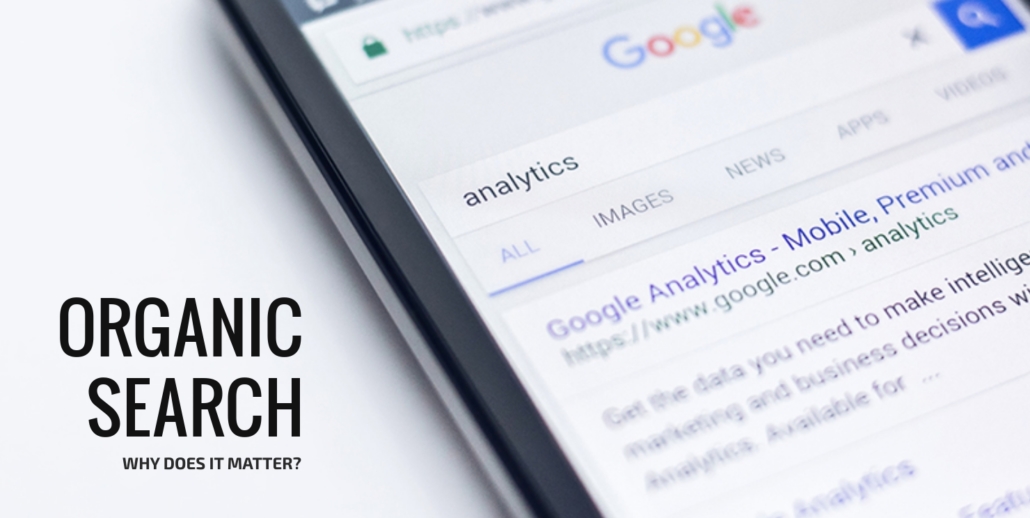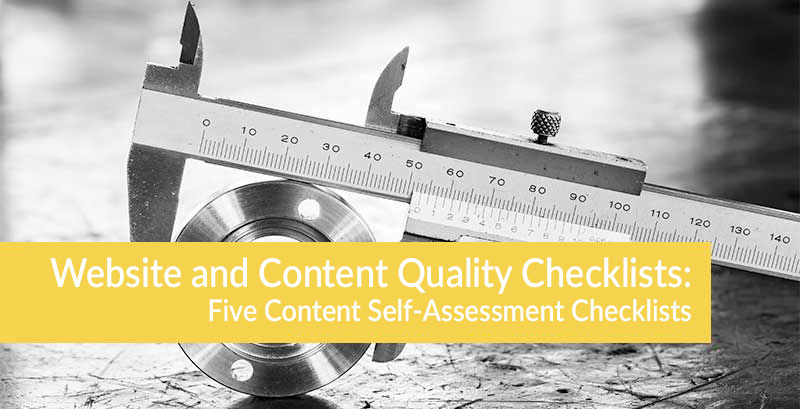Learn why you need to put a priority on content and good design
More changes are coming to how Google evaluates and ranks your web page in search engine results. In May, Google announced it is adding page experience to its ranking algorithm. This means when the new algorithm comes into effect in 2021, your web pages have to give readers both high-quality content and a superior user experience.
To do this, Google will be evaluating and measuring your web pages with a set of page experience metrics and its new Core Web Vitals metrics. Now, at first glance this sounds like a lot – but the good news is, this change to how Google will be measuring and ranking your content is a plus for website owners who have always been paying attention to the keys of SEO and search success.
And even better, you have time. This Google update won’t be rolled out until sometime in 2021. This gives you (and us) ample time to audit your website, review your content, test it on mobile and desktop, and make sure you’re ticking all the boxes for page experience and core web vital metrics.
The one key take-away I want you to know about the new 2021 Google update is summed up perfectly by Sowmya Subramanian, Director of Engineering for Search Ecosystem, Google:
“While all of the components of page experience are important, we will prioritize pages with the best information overall, even if some aspects of page experience are subpar. A good page experience doesn’t override having great, relevant content. However, in cases where there are multiple pages that have similar content, page experience becomes much more important for visibility in Search.”
What is Page Experience?
Page experience is a set of metrics that measure the user friendliness of web pages. The better the user page experience, the better your chance of a positive Google ranking.
The Google Page Experience update includes existing Google ranking factors that website owners should already be taking into consideration. When the new ranking algorithm comes into effect in 2021, website owners who are not giving their users the best possible page experience may see a drop in their search engine results page (SERP) ranking.
The page experience metrics Google is using to evaluate your website include:
- Mobile-friendly: is your website optimized for and easy to use on mobile devices? Use the PageSpeed Insights to learn how mobile friendly your site is. Simply enter your URL and Google tells you how mobile friendly your website is and gives you suggestions on how to make it easier to use on a mobile device.
- Safe browsing: is your website free from malicious code, malware, or social engineering content? Google alerts users when it detects malware or dangerous content that can put them at risk for cyber security threats. In the Google Search Console, open the Security Issues Report to learn the safe browsing status of your website.
- HTTPS: is your website served over HTTPS? HTTPS gives your users (and you) an extra level of security by encrypting data and protecting it from hackers who want to steal confidential information. Check to see if your website connection is secure and if not, learn how to secure your website with HTTPS.
- No intrusive interstitials: is it easy for users to access and read the content on your page? Interstitials are the ads and pop-ups displayed on web pages covering the main page content. Google wants to make sure it’s easy for users to close these interstitials and that they are not impacting page accessibility and mobile friendliness.
It’s important to understand, that to rank well today, your website should already be adhering to these metrics. These four page experience metrics are not new – what is new is how Google will be using them to evaluate and measure the user experience for your website.
This statement from Google on the Google Page Experience update underscores how important it is to give users a positive page experience:
“Because we continue to work on identifying and measuring aspects of page experience, we plan to incorporate more page experience signals on a yearly basis to both further align with evolving user expectations and increase the aspects of user experience that we can measure.”
What are Core Web Vitals Metrics?
Core web vitals metrics are a set of quantifiable metrics that measure web page user experience. These metrics measure the usability of your website, generating a score based on key aspects of website usability.
Google’s core web vitals include two existing quantifiable metrics and one new metric:
- Largest Contentful Paint (LCP): measures how long it takes for your page to load. As you may remember, Google wants your pages to load within 2.5 seconds. Anything longer than this and the user experience drops, and you potentially lose users. Read how Google explains LCP and how you can measure LCP.
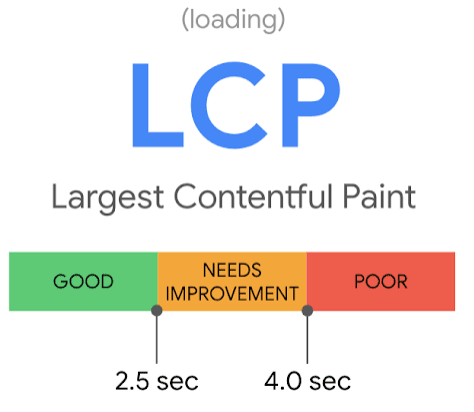
- First Input Delay (FID): measures load responsiveness and interactivity, telling Google what the user’s first impression is of your website. Essentially, Google is measuring the time from when a user clicks a button or link or uses a custom, JavaScript-powered control to how long the browser can respond to this action. To earn a good FID score, your page needs a FID of less than 100 milliseconds. Read how Google explains FID and how you can measure FID.
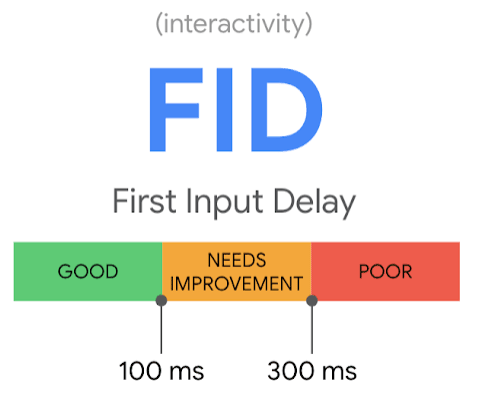
- Cumulative Layout Shift (CLS): measures the stability of the content on your pages. Is the content moving around on the page, making it difficult for users to interact properly with your page? This graphic from Google illustrates the user experience challenges that come with a poor CLS:
You want a CLS of less than 0.1. Read how Google explains the new CLS metric and how you can measure your CLS score.
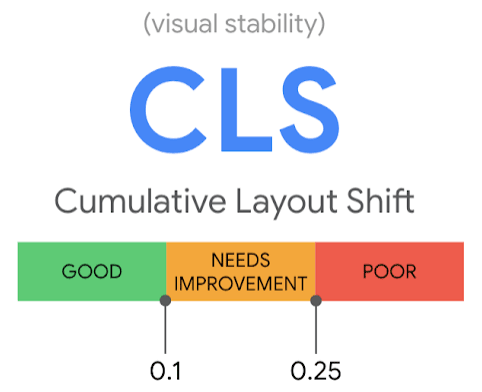
How Page Experience and Core Web Vitals Fit Together
In 2021, Google is combining core web vitals metrics and page experience metrics to generate a search signal for user page experience.
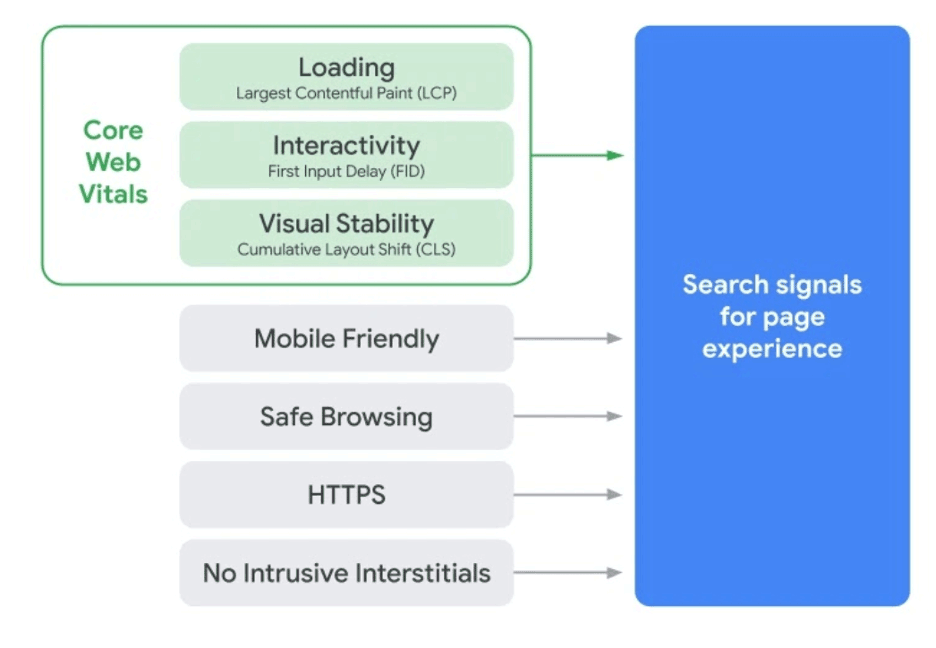
What You Can Do Today to Give Your Users a Superior Page Experience
This recent announcement from Google about page experience and core web vitals metrics emphasize how important it is for website owners to give users a rich and balanced website experience.
Throughout its blog posts about the Page Experience Update and the core web vitals metrics, Google stresses repeatedly the need for website owners to deliver both high-quality content and a positive page experience.
As a website owner, this is the notice you need from Google to focus on giving users what they want, and you need to rank well in Google search results. To prepare for the 2021 update, you need to do the following:
- Audit your website. Make sure all content is of high-quality, update outdated pages, test all links, and make sure your site complies with E-A-T and YMYL.
- Test your website on mobile. Is it easy to use, can people easily find and buy products, and navigate it as easily as on the desktop?
- Understand Top Stories and AMP. With this update, AMP is no longer required for pages to be included in Google’s Top Stories. However, Google is using page experience as a ranking factor in Top Stories.
- Evaluate your page content. It is critical your page content is high-quality. Google considers this to be essential and stresses that a positive page experience does not trump content quality.
- Use the tools Google gives you. Take advantage of the six tools Google provides to measure page experience and core web vitals. Read this article to learn about these tools and how to use them.
- Make sure you have your SEO basics right. Don’t overlook essential SEO basics including HTTPS, quality content, internal links, and interstitial best practices. This is the ideal time to sign-up for the free Know Agency 8-Week SEO Basics Course – you’ll learn how to get the basics of SEO right and how to get your website ready for the 2021 Google Page Experience Update.
Contact me or Kevin to discuss how we can make sure your website is giving users a positive page experience.
About the author
Jane Phelps is the CEO/Partner at Know Agency. Jane leads client SEO strategy and handles all aspects of in-house SEO demands. This includes providing SEO training, competitive analysis, keyword research, algorithm analysis, and the review of all new content to ensure SEO best-practices are followed. Jane holds a Master’s Certificate in Online Marketing from the University of San Francisco, is BrightEdge Certified.


